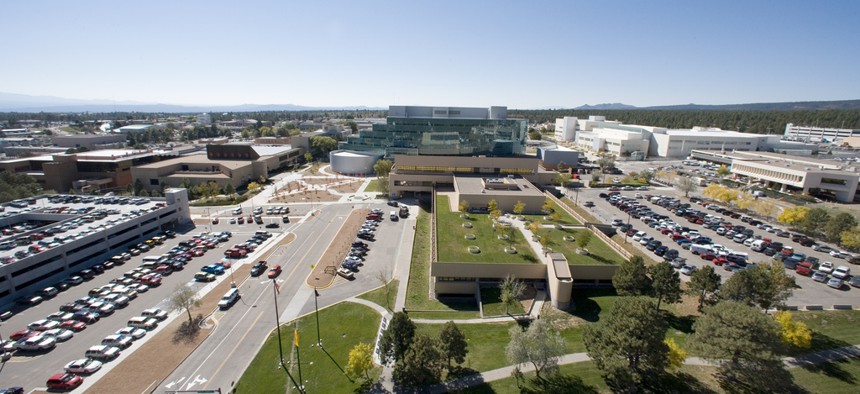
The firm that manages the Los Alamos National Laboratory “received only 68 percent of its possible at-risk award fee of $46.5 million for the last budget year." Los Alamos National Laboratory
NNSA Defends Contract Extensions but Congressional Scrutiny Expected
Issue is likely to come up at oversight hearings in the next few months.
The National Nuclear Security Administration is defending itself against charges that it renewed lucrative deals for undeserving contractors, but the issue is likely to come up at congressional oversight hearings in the coming months, sources say.
The semiautonomous Energy Department agency’s Fiscal 2012 Performance Evaluation Reports, released on March 1, contain evidence that NNSA officials made exceptions that enabled the extension of contracts pertaining to at least two nuclear arms research laboratories, according to watchdog organizations.
Nuclear Watch New Mexico said last week that earning at least 80 percent of an “at-risk incentive award fee is the threshold for eligibility for a one-year contract extension” at NNSA sites. The firm that manages the Los Alamos National Laboratory in New Mexico “received only 68 percent of its possible at-risk award fee of $46.5 million for the last budget year, primarily because of cost overruns that ballooned a security project from $213 million to $254 million,” according to a press releasefrom the organization.
Nonetheless, Neile Miller, then the agency’s top award determining official and now its acting chief, overrode a decision by NNSA site personnel and granted Los Alamos National Security a waiver that extends its contract through fiscal 2018, the group said.
A similar situation occurred regarding the contract of a consortium -- consisting of Bechtel National, the University of California, Babcock and Wilcox, the Washington Division of URS and Battelle -- that manages the Lawrence Livermore National Laboratory in California, the group said.
Lawrence Livermore National Security earned 78 percent of its “available at-risk incentive fee, still short of the gateway of 80 percent,” the group said. “However, acting NNSA Administrator Neile Miller overrode that too, giving the lab contractor an extra $541,527 to help it meet the 80 percent mark and extending the management contract another year.”
A separate release from the California-based Tri-Valley CAREs complains that the exception is noted in a “one-paragraph addendum” to the fiscal year report that “does not provide a rationale” for the waiver. The group called for “greater oversight of taxpayers’ money and a more open and transparent contract process.”
Nuclear Watch New Mexico cited the spiraling cost of the Los Alamos security system for its Technical Area 55 as one of a number of NNSA projects in which expenses have exceeded projections.
The organization said that to avoid future cost overruns, the government should emphasize conservative life-extension programs for nuclear warheads that do not involve the creation of new military capabilities. In addition to costing more, introducing “untested changes to existing nuclear weapons” could “erode confidence in their reliability,” the group suggested.
Congress should also “pull the plug on exorbitant failed projects” such as Lawrence Livermore’s National Ignition Facility and an unfinished plant for turning nuclear-weapon plutonium into reactor fuel at the Savannah River Site in South Carolina, the group says.
Agency spokesman Josh McConaha defended Miller’s decisions and suggested that the watchdog groups might be missing the bigger picture.
“Contractors are given multiple assignments each year and each is important,” McConaha toldGlobal Security Newswire. “The ratings given the contractor must reflect all of the results for all of these activities and cannot be based on just one. Doing so would be short-sighted and leave out not just a lot of context, but a lot of important work.”
A congressional staffer who follows the issue said, though, the concerns raised by the watchdog groups are “valid.” The aide, who spoke on condition of anonymity due to not being authorized to discuss the issue publicly, said lawmakers will likely raise the matter during NNSA oversight hearings this year.
Congress has previously attempted to address lack of transparency and other issues between assessments for different NNSA sites.
The fiscal 2013 National Defense Authorization Act contains language requiring the NNSA administrator to “take appropriate actions to make available to the public, to the maximum extent practicable, contractor performance evaluations conducted by the administration of management and operating contractors of the nuclear security enterprise that results in the award of an award fee to the contractor concerned.”
According to the law, the performance evaluations should be “in a common format that facilitates comparisons of performance evaluations between and among similar management and operating contracts.”
The nonpartisan Government Accountability Office has also raised concerns about the extension of NNSA contracts for management of its facilities. Assistant Director Allison Bawden said last month that the inconsistent NNSA enforcement of contract terms could be problematic, the Nuclear Weapons Materials and Complex Monitor reported.
“What kind of message do these actions send to potential bidders on future … contracts?” Bawden said. “Will they take the contract structures as seriously?”
NEXT STORY: Do You Need to Meet Everyone You Hire?







